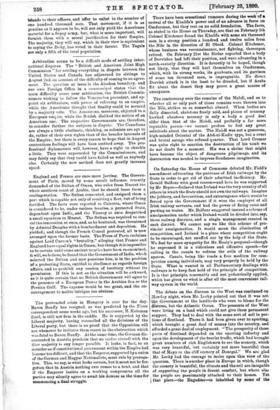On Saturday the House of Commons debated Mr. Field's amendment
advocating the purchase of Irish railways by the State in order to get rid of their admitted inefficiency. Mr. Gerald Balfour with good reason—and here he was supported by Mr. Bryce—declared that Ireland was the very country of all others in which the State should not own the railways. Imagine the jobbery, and favonritism, and extravagance which would be forced upon the Government if it were the employer of all Irish railway servants, and had the power of fixing rates and putting on trains. Mr. Balfour suggested instead a scheme of amalgamation under which Ireland would be divided into, say, three railway districts, and a single management created in each district. We cannot say we like this scheme of pro- vincial amalgamation. It would mean the elimination of competition, and Ireland is a place where competition ought to be encouraged, not snuffed out by the help of the State. We feel far more sympathy for Mr. Healy's proposal—though he expressed it in a ridiculous and offensive speech—for calling in the canals to redress the evils of the railway system. Canals, being like roads a free medium for com- petition among individuals, may very properly be held by the State. What is wanted in all Parliamentary dealings with railways is to keep fast hold of the principle of competition. It is that principle, reasonably and not pedantically applied, which has given us what is after all the most convenient rail- way system in the world.






































 Previous page
Previous page